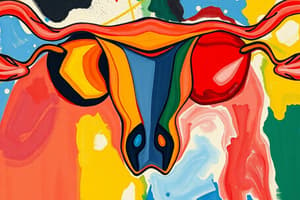Podcast
Questions and Answers
What is the primary sex hormone that is primarily produced in the testes of males and the ovaries of females?
What is the primary sex hormone that is primarily produced in the testes of males and the ovaries of females?
- Melatonin
- Estrogen
- Testosterone (correct)
- Progesterone
Which gland releases the hormone that stimulates the production of testosterone in males?
Which gland releases the hormone that stimulates the production of testosterone in males?
- Pituitary gland (correct)
- Thyroid gland
- Adrenal gland
- Pancreas
What are some consequences of low levels of testosterone in males according to the text?
What are some consequences of low levels of testosterone in males according to the text?
- Enhanced bone density
- Delayed puberty (correct)
- High libido
- Increased muscle mass
Which hormone regulates the production of testosterone in the male endocrine system?
Which hormone regulates the production of testosterone in the male endocrine system?
What symptoms can high levels of testosterone lead to in both men and women?
What symptoms can high levels of testosterone lead to in both men and women?
How does aging affect testosterone levels in men and women?
How does aging affect testosterone levels in men and women?
What is a potential consequence of low testosterone levels in men?
What is a potential consequence of low testosterone levels in men?
Why is testosterone supplementation for healthy individuals not recommended?
Why is testosterone supplementation for healthy individuals not recommended?
In which group of individuals is testosterone replacement therapy not recommended?
In which group of individuals is testosterone replacement therapy not recommended?
Why is testosterone treatment typically not administered to women?
Why is testosterone treatment typically not administered to women?
Study Notes
Discovering the Power of Testosterone: A Hormonal Journey
Testosterone, often dubbed the "male hormone," is a vital part of our endocrine system. It plays a crucial role in our physical, emotional, and cognitive health, affecting both men and women in unique ways. In this exploration of testosterone, we'll uncover the diverse functions of this hormone, its production, and the consequences of imbalances.
The Biology of Testosterone
Testosterone is a sex hormone primarily produced in the testes of males and the ovaries of females. However, it's mostly associated with male development and function. In men, testosterone impacts muscle mass, bone density, libido, and mood; it also influences the development of secondary sexual characteristics during puberty. In addition to its role in reproductive health, testosterone is involved in protein synthesis, fat distribution, and red blood cell production.
Testosterone production is regulated by the hypothalamus and the pituitary gland. The hypothalamus releases gonadotropin-releasing hormone (GnRH), which in turn stimulates the production of luteinizing hormone (LH) in the pituitary gland. LH then travels to the testes to stimulate testosterone production.
Testosterone's Impact on Humans
In males, testosterone influences both physical and emotional development. Low levels of testosterone can result in delayed puberty, decreased muscle mass, reduced bone density, and low libido. Conversely, high levels of testosterone can lead to aggressive behavior, acne, and body hair growth.
Testosterone also plays a role in women's health, albeit in much lower quantities than in men. Testosterone levels in women can impact mood, energy levels, and libido. Imbalances in women can result in symptoms such as mood swings, depression, and decreased libido.
Testosterone and Aging
As men age, their testosterone levels naturally decline, leading to a condition called "androgen deficiency in aging males" (ADAM). ADAM can result in symptoms such as decreased muscle mass, reduced bone density, and mood changes. Testosterone replacement therapy may be an option for men experiencing ADAM.
In women, testosterone levels also decrease with age, but the impact is generally less severe than in men. However, women experiencing menopause may experience testosterone-related symptoms such as mood swings, decreased libido, and fatigue.
Testosterone and Performance
Testosterone plays a significant role in athletic performance, as it enhances muscle mass, power, and endurance. However, it's essential to note that the correlation between testosterone and athletic performance does not necessarily translate to improved performance in everyday activities. Testosterone supplementation for healthy individuals is not recommended and may lead to unintended consequences.
Testosterone and Health Concerns
Imbalances in testosterone levels can lead to various health concerns. For example, low testosterone levels in men can result in hypogonadism, a condition characterized by reduced sperm production, infertility, and erectile dysfunction. On the other hand, high testosterone levels can lead to polycystic ovary syndrome (PCOS) in women, a condition associated with irregular menstrual periods, infertility, and increased body hair.
Testosterone and Medical Treatments
Testosterone replacement therapy is available for men experiencing ADAM. This treatment can help restore testosterone levels, leading to improvements in muscle mass, bone density, and mood. Testosterone replacement therapy is not recommended for men without ADAM or for those with normal testosterone levels.
Testosterone treatment is not typically administered to women due to the risk of side effects such as increased body hair, acne, and deepening of the voice. However, testosterone creams or gels may be prescribed to women experiencing low libido or low testosterone due to specific medical conditions.
In conclusion, testosterone plays a vital role in human health, affecting both men and women. Testosterone imbalances can lead to various health concerns, and it's essential to consult a medical professional when considering testosterone treatment. By understanding the functions and impacts of testosterone, we can make informed decisions about our health and well-being.
Studying That Suits You
Use AI to generate personalized quizzes and flashcards to suit your learning preferences.
Description
Delve into the world of testosterone, a hormone crucial for physical, emotional, and cognitive well-being in both men and women. Learn about its production, impacts on health, aging effects, performance enhancement, and related medical treatments.



